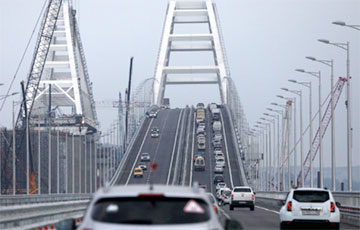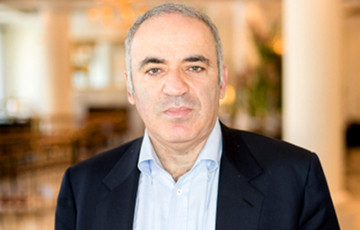Mustafa Dzhemilev: Russians Should Better Leave Crimea
23- 22.08.2022, 19:32
- 29,732

Yelling that they "have been living on the peninsula for a long time" will not help.
The leader of Crimean Tatars Mustafa Dzhemilev spent more than 15 years in Soviet prisons and camps, he suffered because of his fight for the rights of his people and for their return to their native land. In 1989, his dream came true, but after Russia declared the peninsula its territory, the leader of Crimean Tatars was banned from entering Crimea. Today, Ukraine declares that the return of the occupied peninsula is one of the goals in the war against Russia.
What will be the future of Crimean Tatars? What will happen to the Crimean bridge? Will Russia collapse? Mustafa Dzhemilev spoke about this in an interview with Charter97.org.
— Recently, Russian military facilities began to detonate in temporarily occupied Crimea. Is the resort season for Russians over?
— In fact, even before the explosions, there were not a lot of tourists, but after the explosions in general, we can say that the resort season is almost disrupted. And this is despite the fact that many countries just do not let Russian tourists in. Now, there are many kilometers of traffic jams with tourists and not only tourists who are heading to Russia against the backdrop of explosions at military bases.
— Do you support the point of view that the Kerch bridge should be destroyed as soon as the Armed Forces of Ukraine have such an opportunity?
— This bridge, as you know, is illegal, since it was built on the land and water area of Ukraine by another state without the permission of Ukraine. Secondly, a flow of weapons is constantly going along this bridge for shelling our cities and villages and killing our people. Therefore, it is legal and justifiable to destroy this bridge beyond doubt. However, there is another opinion. For example, our Crimean compatriots are asking, “What will happen to the Russians who were brought after the occupation of Crimea? After all, there are more than a million of them, how will they run away?" But the final decision on this bridge, apparently, will be taken by our military command, taking into account all the circumstances. Russian statements that the Crimean Bridge is impregnable, that there is a powerful anti-aircraft defence, etc., I believe, will not ensure its integrity.
Anything can happen during a war. The flagship of the Russian Black Sea Fleet, their most powerful cruiser Moskva, also had powerful anti-aircraft weapons. Now, as Russian propaganda explains, the navy men smoked in the wrong place and the flagship sank. The military bases in Novofedorivka, Dzhankoi, Hvardiiske, and Belbek in Crimea certainly had powerful anti-aircraft weapons, but all of a sudden the other day they all began to "detonate" and destroy military aircraft, rocket launchers, etc. located there.
— How did it happen that in the first three days of a full-scale war, the occupiers were able to advance 200 kilometers to the south?
— This is one of the most frequently asked questions in Ukraine. They are speaking a lot about betrayal, about Russian agents introduced into the military structures of Ukraine. So far, the head of the Security Service of Ukraine of the Kherson region has been arrested on charges of treason. We will see a more accurate picture of events, apparently, only after the end of the war.
— Crimean Tatars have been subjected to repressions for centuries, regardless of the political structure of Russia: whether it be the czarist rule, advanced socialism or fascism. What is the reason for such hatred of Russians towards the indigenous people of Crimea?
— From the first time of the occupation of Crimea in 1783, Russia began to take measures to oust the indigenous people from their homeland and settle Crimea with ethnic Russians. The main reason for this was formulated by Count Potemkin in a letter to Catherine II: “The land here is fertile, it is necessary to expel the infidels and populate Crimea with natural Russians.”
But the reason was not only the grace of the Crimean land, but the fact that Russia always had plans for further expansion, the capture of the Bosphorus and Dardanelles, Istanbul, etc. , and therefore there was a desire to get rid of the Muslim and Turkic population in the frontline zone. The main method of ousting the indigenous people was the seizure of land and, accordingly, depriving people of their means of subsistence, mass repressions on various grounds.
The largest emigration of the Crimean Tatars happened after the Crimean War of 1853-1855, when they decided that their defeat in this war had been caused by the disloyalty of the indigenous population of Crimea. They believed, Crimean Tatars were not sufficiently loyal to the Russian occupiers.
Further expansionist plans were also one of the reasons for the total deportation and genocide of Crimean Tatars in 1944 by the Soviet regime, which was even more chauvinistic than the czarist rule. At the same time, dozens of small peoples of the North Caucasus and Crimea were deported, including Chechens, Ingush, Balkars, Karachays, Kalmyks, and others. Moreover, according to the well-known Chechen writer, and former party activist A. Avtorkhanov, Kalmyks were evicted just because of a bureaucratic typo.
The list of peoples to be deported from the North Caucasus should have included the "Kumyks", one of the Turkic Muslim peoples of the Caucasus, but they erroneously printed “Kalmyks”. And after their deportation, they began to come up with arguments and arguments to justify this crime.
The Nazis, by the way, were also going to deport the Crimean Tatars during World War II. Instead, they were going to populate Crimea with Germans from the territory of South Tyrol disputed with Italy, and to rename Crimea to Goathland on the grounds that once in ancient times Germanic tribes of the Goths also lived in Crimea.
I remember that in the second half of the 90s, during our trip to South Tyrol, one of the leaders of the German community said: “It’s good that Hitler didn’t succeed, otherwise we would now, just like Crimean Tatars, fight for the return to our homeland.”
— You underwent Soviet camps and, unfortunately, today many Crimean Tatars follow your path. Which Gulag is scarier: Soviet or Putin's?
— There were different conditions in Soviet camps at different times. Stalin's extermination camps are one thing. There, thousands of people died of hunger, overwork, or simply shot. It was different, let's say, in the relatively “vegetarian” years of the CPSU, that is, in post-Stalin times. The situation in today's Putin's prisons in terms of observance of elementary human rights, judging by the stories of the prisoners in many respects is comparable mainly with Stalin's prisons. Yes, and the sentences for the dissidents were about the same as in Stalin's times.
Under the Soviets, articles 190-1 of the RSFSR Criminal Code (“compiling and distributing documents discrediting the state system and its political system”) against dissent, provided for imprisonment of up to 3 years and article 70 of the RSFSR Criminal Code (“anti-Soviet agitation and propaganda” with the intent to undermine the Soviet system ”), up to 7 years in prison and 5 years of exile. Now in Crimea for objectionable conversations or possession of literature, which is considered prohibited in Russia, people are given 17-20 years. Moreover, very often this "forbidden literature" is planted by the FSB officers during searches in the apartments of the people they decided to arrest. Sophisticated tortures against the arrested are also basically comparable to the practice of Stalin's times.
— Looking to the future, do you think Russia will survive as a unified state?
— The Russian Empire, as you know, was a state formed as a result of bloody conquests of many peoples' lands. --- The Russian Empire and the Russian Federation, as you know, were formed as a result of bloody conquests of many peoples' lands.
— What to do with the Russians who came to Crimea after its occupation?
— All Russian citizens who arrived in Crimea after its occupation in 2014 are considered by Ukrainian legislation as persons who illegally crossed the state border of Ukraine, and, accordingly, should be held accountable.
Therefore, the best thing for these people would be to leave Crimea by themselves before the coming of Ukraine. Yelling that they have been living in Crimea for a long time, that their children were born here, and that in general, they were against Putin "in their hearts", I believe, will not help.
— What is the future of the Crimean Tatar people in your opinion?
— If Crimea remains part of Russia, which is very unlikely, then our people will have no future. A lot of people will leave the peninsula to breathe the air of freedom, and the rest will face total Russification and, under the influence of powerful Russian propaganda, will turn into, according to Chingiz Aitmatov, some kind of mankurts (people with no historical memory - Ed.). But there are good prospects in the case of liberation.
The law of Ukraine on indigenous peoples has already been adopted. According to it, Crimean Tatars and very few Karaites and Krymchaks are recognized as indigenous. Based on this law, the Law on the status of the Crimean Tatar people in Ukraine is being prepared for reading, and then, apparently, an amendment will be made to the Constitution of Ukraine, according to which the amorphous and essentially Russian Autonomous Republic of Crimea will be reformatted into the Crimean Tatar national-territorial autonomy within Ukraine. This, of course, gives guarantees for the preservation and development of the indigenous ethnic group of Crimea.











